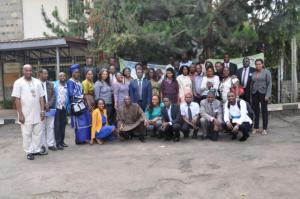Ethiopia Hosts International Training on Malaria Control Programme Management
A six-week international training of trainers (ToT) on Planning and Managing Malaria Control Programmes for Health Workers of Anglophone African Countries got concluded successfully in Addis Ababa on 9 October 2015. The World Health Organization (WHO), in collaboration with the Ministry of Health and the Ethiopian Public Health Institute (EPHI) organized the training course that brought together 34 participants from 14 Anglophone countries in the WHO Africa Region. Participants attending this training course came from Botswana, Burundi, Ethiopia, Ghana, Liberia, Malawi, Namibia, Sierra Leone, South Sudan, Tanzania/Zanzibar, The Gambia, Uganda, Zambia and Zimbabwe.
During the 42 days-long training, participants covered seven different modules developed by WHO and reviewed by partners including ministries of health, research institutions and universities.
During the closing ceremony of this training, Dr Adugna Woyessa, Director of Bacterial, Parasitic & Zoonotic Diseases Research at the Ethiopian Public Health Institute (EPHI), said that the skills and knowledge acquired during this training will contribute highly to achieving the goals and objectives described in the Africa Malaria Strategy (AMS) for the elimination of malaria in the continent by 2030. “EPHI will commit itself by providing professionals and venue as well as working together with WHO and other partners for the elimination of malaria in Africa,” he added.
WHO, with partners including the Ethiopian Ministry of Health, have been developing the Africa Malaria Strategy: Accelerating towards malaria elimination in africa, which will be finalized and ready for implementation after inputs by WHO Africa Region countries.
The strategy is based on the Global Technical Strategy (GTS) for Malaria which was endorsed by the World Health Assembly in May 2015.
Dr. Basimike Mulenda, WHO regional focal person for malaria capacity building in Africa, expressed his hope that these young and energetic African malaria health workers will work effectively to contribute to malaria control and elimination in their respective countries. “We believe that the Africa malaria strategy aiming to eliminate malaria by 2030 through capacity building will become a reality. The role of the trainees, apart from scaling up the malaria intervention, is also cascading these trainings from the national to the district and community level,” he said. The training incorporated classroom sessions, field trips to Bishoftu and Adama towns, and practical sessions on vector identification.
Over three billion people – 40% of the world population are at risk of malaria. In 2013 alone, 584,000 people worldwide, 90% of whom were in Africa, died from malaria. Leaders of African nations, in the resolve to eliminate Malaria by 2030, have established the Africa Leaders Malaria Alliance (ALMA). Ethiopia’s Prime Minister, H.E. Hailemariam Desalegn, is the current Chair of ALMA.
For more information, please contact:
Program: Dr Worku Bekele; workub [at] who.int (workub[at]who[dot]int)
Communication: Biniyam Wubshet Fisseha; fissehab [at] who.int (fissehab[at]who[dot]int)



